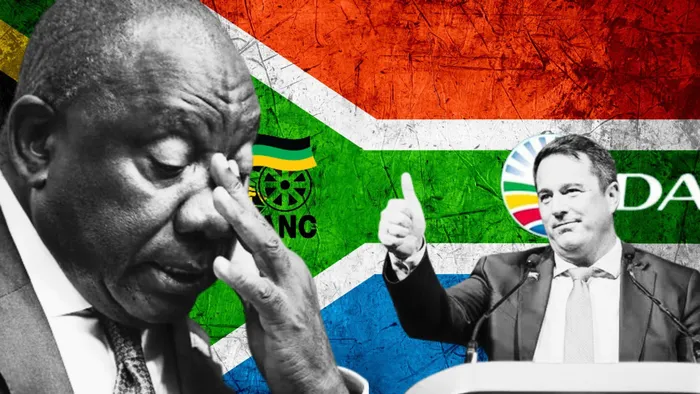Signs of the DA dancing to a new tune with ANC

The DA has been vocal about corruption in the ANC. However, since becoming part of the Government of National Unity, the DA appears to have changed its stance as seen in the party’s reactions to the EFF’s attempts to impeach President Cyril Ramaphosa for the Phala Phala scandal, says the writer. Graphic: IOL
The outcome of the May 29 general election did not produce an outright winner according to the official results. This meant that some form of joint government had to be formed.
After first considering a coalition government, the ANC eventually settled for a Government of National Unity (GNU).
This was extended to Governments of Provincial Unity (GPUs) in those provinces where the ANC did not meet the 50 plus one threshold such as in KwaZulu-Natal and the Northern Cape.
This form of government has meant different things to different political parties. Those parties which opted not to join the GNU for one reason or the other welcomed the opportunity to occupy opposition benches so that they could hold the executive accountable.
Of the parties that joined the GNU, smaller parties such as the Patriotic Alliance, PAC, and others with no more than three seats saw their leaders being elevated to positions of ministers or deputy ministers. Either way, they benefited because this would not have been possible without the GNU.
Of the three major parties in the GNU (the ANC, DA and IFP), the ANC was the main beneficiary. The IFP was allocated certain positions, which it accepted without any qualms. This shows political maturity on the side of the IFP because it understands what a GNU means.
The main struggle was between the ANC and the DA. Although the DA knew it had obtained 87 seats in the 400-member National Assembly against the ANC’s 159, it made huge demands on the ANC. These included the position of deputy president and over 10 ministerial positions.
After the war of words, the ANC emerged with a smile. While this is a GNU, the president and his deputy come from the ANC. This is not common in GNU politics. Second, most of the key ministries such as Finance, Health, Defence, International Relations and Co-operation, and others remained in the ANC.
But the ANC has scored the highest in “taming” the DA. For years, the DA has been vocal about what it called rampant corruption within the ANC. Even its campaign slogan was “Save South Africa”.
The argument was that if voters wanted to “save” South Africa from the “corrupt” ANC, they had to vote the DA into power. Surely, this goal was not achieved.
When Arthur Fraser spilt the beans about the Phala Phala saga, the DA was excited. It now had something to use as evidence – adding to the Zondo Commission Report. During its election campaign, the DA placed corruption on the number one list of reasons why South Africans should not vote for the ANC.
Since the conclusion of the GNU deal, the DA has lost its identity and focus. Suddenly, there is no talk about the “corrupt ANC”.
When the EFF approached the Deputy Speaker of the National Assembly, Dr Annelie Lotriet, to resuscitate the Phala Phala matter, the DA was clear that it was not going to support any motion meant to impeach President Cyril Ramaphosa, invoking Section 89 of the Constitution.
The question becomes: Has the Phala Phala saga suddenly become a good thing to have happened now that the DA is part of the GNU? Broadly, how does one interpret the DA’s conspicuous silence about corruption in the ANC, the high crime rate, rising inequality, poverty, and the lack of service delivery under its leadership?
Importantly, has the DA’s decision to relinquish its official opposition status resulted in the party’s loss of identity? What does the DA now stand for?
These and other questions are critical in understanding DA politics since it formed part of the GNU. One wonders if the DA was genuinely opposed to corruption or if it made the loudest noise simply to sit at the high table. Now that it is there, all the wrongs of the past once associated with the ANC have miraculously dissipated like dew at sunrise.
At the centre of the DA’s change of stance is the issue of the electorate. If the DA promised voters to do something about the issues it raised against the ANC, does its sudden change of language not amount to the betrayal of the voters? It appears that the DA has reneged on its promise to try its best to reverse what it used to blame the ANC for.
If the ANC is guilty of these sins, then the DA is an accomplice to the crime. It can no longer claim innocence when things go wrong in the country because it is part of the government.
One thing the DA must not forget is that this is not the last election. In 2026, there will be the local government elections. If voters feel betrayed by the DA in this election, what will stop them from taking their vote elsewhere in 2026, and again in the 2029 general election?
These questions should force the DA to redefine its identity sooner rather than later.
As the DA uses the GNU as the cooling-off period and recalls its soldiers from the battlefield, the ANC must use this “ceasefire” to regroup and carve a clear plan for the 2026 and 2029 elections. Should it go into slumber, it might wake up occupying the opposition benches.
Other political parties should watch the DA-ANC actions carefully and draw lessons for the future.
* Prof Bheki Mngomezulu is Director of the Centre for the Advancement of Non-Racialism and Democracy at the Nelson (CANRAD) Mandela University
** The views in this article are the writer’s and do not necessarily reflect the views of The African